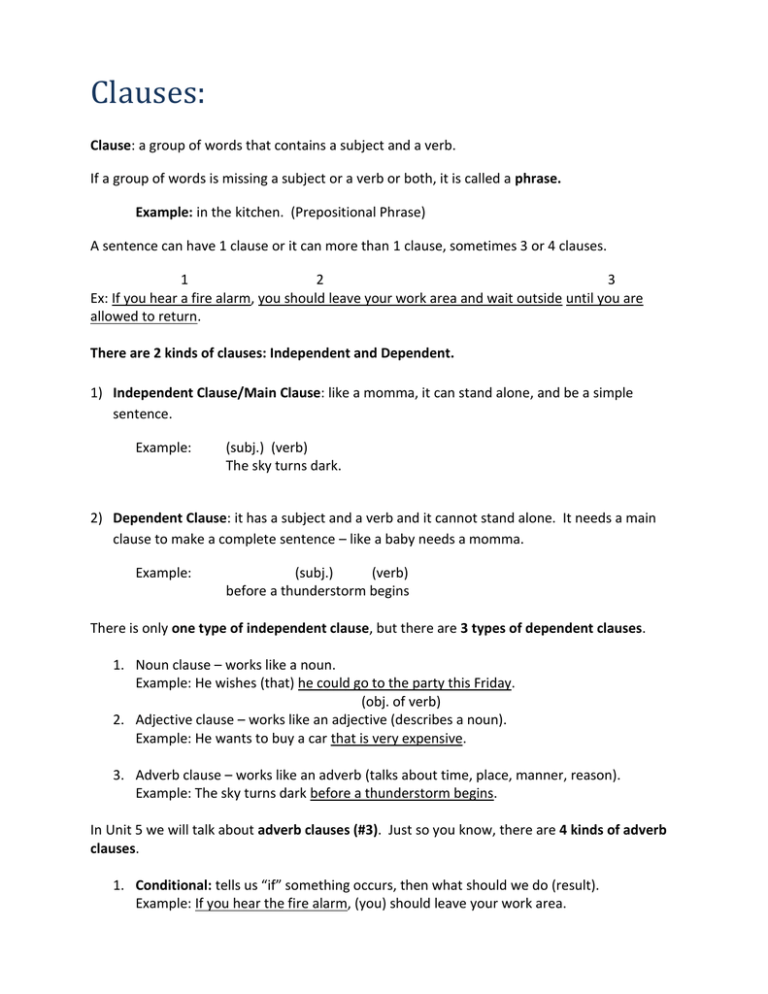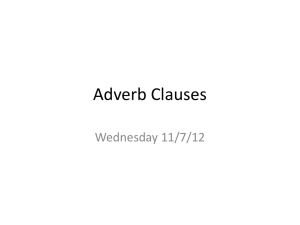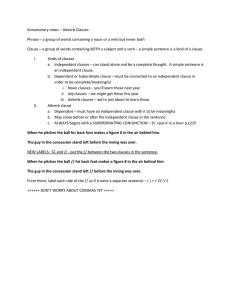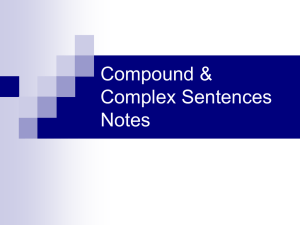Clauses:
advertisement

Clauses: Clause: a group of words that contains a subject and a verb. If a group of words is missing a subject or a verb or both, it is called a phrase. Example: in the kitchen. (Prepositional Phrase) A sentence can have 1 clause or it can more than 1 clause, sometimes 3 or 4 clauses. 1 2 3 Ex: If you hear a fire alarm, you should leave your work area and wait outside until you are allowed to return. There are 2 kinds of clauses: Independent and Dependent. 1) Independent Clause/Main Clause: like a momma, it can stand alone, and be a simple sentence. Example: (subj.) (verb) The sky turns dark. 2) Dependent Clause: it has a subject and a verb and it cannot stand alone. It needs a main clause to make a complete sentence – like a baby needs a momma. Example: (subj.) (verb) before a thunderstorm begins There is only one type of independent clause, but there are 3 types of dependent clauses. 1. Noun clause – works like a noun. Example: He wishes (that) he could go to the party this Friday. (obj. of verb) 2. Adjective clause – works like an adjective (describes a noun). Example: He wants to buy a car that is very expensive. 3. Adverb clause – works like an adverb (talks about time, place, manner, reason). Example: The sky turns dark before a thunderstorm begins. In Unit 5 we will talk about adverb clauses (#3). Just so you know, there are 4 kinds of adverb clauses. 1. Conditional: tells us “if” something occurs, then what should we do (result). Example: If you hear the fire alarm, (you) should leave your work area. 2. Time: tells us “when, before, after, as soon as, or until” something occurs. Example: The sky turns dark before a thunderstorm begins. 3. Cause and effect: tells us the reason something occurs and uses “because.” Example: The school is closed because it snowed last night. 4. Oppositional: tells us the opposite of what we expect, uses “although or even though” Example: The school is open even though it snowed last night. Clauses (S + V) 1. Independent Clause* 2. Dependent Clauses (It can stand alone.) 1. Noun Clauses 1. Conditional 2. Adjective Clauses 2. Time 3. Adverb Clauses 3. Cause & Effect 4. Oppositional In Unit 5 we will study the first 2 kinds of adverb clauses: conditional and time. Some last notes about adverb clauses: 1) You can put them 1st in sentence: Example: If you hear the fire alarm, (you) should leave your work area. Or you can put them second. The meaning doesn’t change. Example: You should leave your work area if you hear the fire alarm. **Punctuation rule: If you put the adverb clause first, you need a comma. If you put it second, you don’t need a comma. 2) When you make a question, you never use question word order in the adverb clause, only in the main clause. Example: Do I leave the work area if I hear the alarm? If I hear the alarm, do I leave the work area? Can you find the clauses in the following sentences? What kind of clauses are there? 1. Cooking is the main cause of fires in the U.S.A. 2. If a pan catches fire, put a lid over it. 3. When you finish cooking, remember to turn off the stove and oven. 4. A fire can also start if a smoker leaves a cigarette burning in an ashtray. 5. If you use a space heater, don’t put it too close to your bed, or it might catch your blanket on fire. 6. If we live with someone who smokes, and (if) we want to keep our home safe, what do you recommend?





